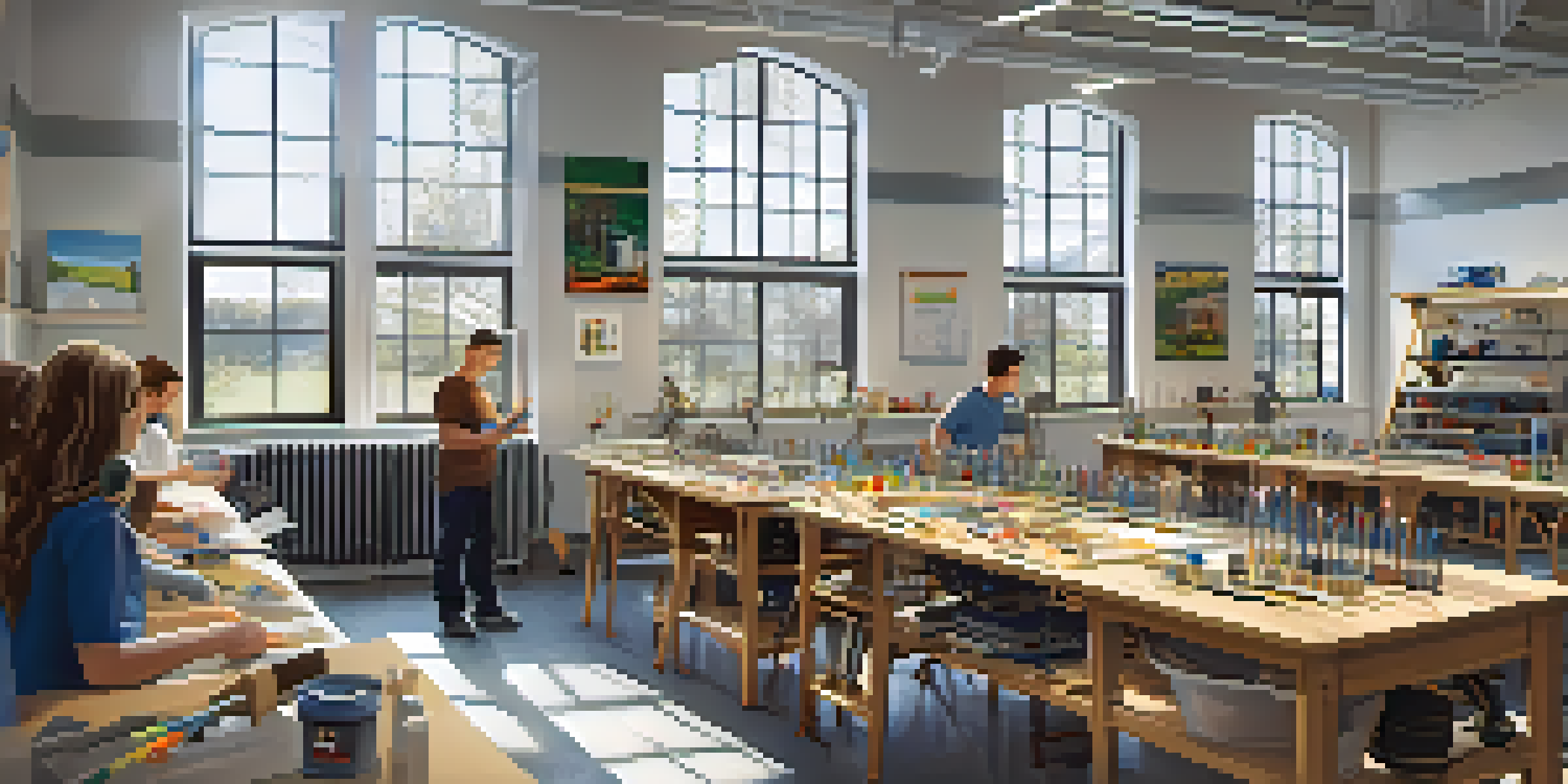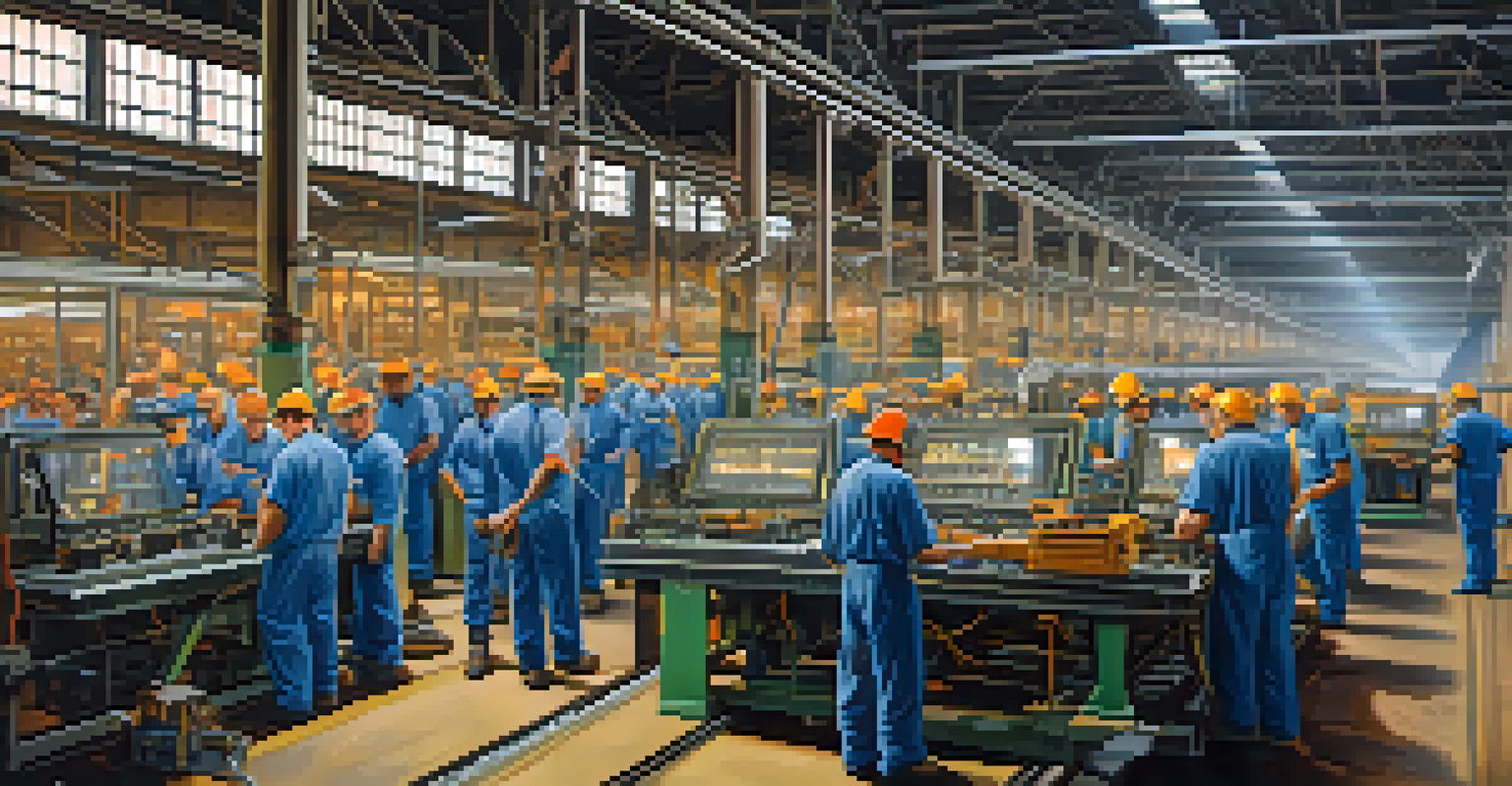The Future of Manufacturing in Detroit: Challenges and Solutions

The Historical Significance of Manufacturing in Detroit
Detroit has long been known as the Motor City, a title earned through its rich manufacturing history, particularly in the automotive sector. The city's factories once buzzed with the sound of assembly lines, contributing significantly to both local and national economies. Today, this legacy shapes the identity of Detroit, but it also sets the stage for the challenges that lie ahead.
The best way to predict the future is to create it.
Understanding Detroit's manufacturing roots is essential to grasping its current state. The decline of traditional manufacturing jobs in the late 20th century left a profound impact, leading to economic shifts and a population exodus. Yet, this history also provides a foundation for reinvention and innovation in the face of modern challenges.
As we look to the future, it’s crucial to appreciate how Detroit's manufacturing narrative informs its present and future. This context helps us recognize the potential for growth and transformation as the city seeks to reclaim its status as an industrial powerhouse.
Current Challenges Facing Detroit's Manufacturing Sector
Manufacturing in Detroit today faces a myriad of challenges, from automation and global competition to workforce shortages. Automation, while enhancing efficiency, has led to fears about job displacement, leaving many workers anxious about their futures. Additionally, competition from overseas manufacturers can make it difficult for local businesses to thrive.

Another pressing issue is the need for a skilled workforce. Many manufacturing jobs now require specialized training and education, but there is a gap between the skills workers possess and what employers need. This mismatch not only hampers productivity but also stifles innovation and growth within the sector.
Reviving Detroit's Manufacturing Roots
Understanding Detroit's manufacturing history is essential for navigating its current challenges and leveraging opportunities for future growth.
Moreover, the COVID-19 pandemic highlighted vulnerabilities in supply chains, causing disruptions that many manufacturers are still trying to recover from. These challenges collectively pose significant hurdles, yet they also create opportunities for change and improvement in Detroit’s manufacturing landscape.
The Role of Technology in Manufacturing's Future
Technology is at the forefront of reshaping manufacturing in Detroit. Innovations such as the Internet of Things (IoT), artificial intelligence (AI), and advanced robotics are revolutionizing how products are made and delivered. These technologies not only increase efficiency but also help reduce waste, making manufacturing more sustainable.
Innovation distinguishes between a leader and a follower.
For example, IoT devices can monitor equipment in real-time, predicting maintenance needs before a breakdown occurs. This predictive maintenance saves time and money, while AI can optimize production schedules, ensuring that resources are used effectively. Such advancements can position Detroit as a leader in cutting-edge manufacturing practices.
As companies adopt these technologies, the demand for tech-savvy workers will skyrocket. This shift emphasizes the importance of integrating technology training into educational programs, preparing the workforce for the jobs of tomorrow and ensuring that Detroit remains competitive in a global market.
Emphasizing Sustainability in Manufacturing Practices
Sustainability is becoming a key focus for manufacturers in Detroit, reflecting a growing awareness of environmental impact. Companies are increasingly adopting green practices, such as using renewable energy sources and minimizing waste. This shift not only helps the planet but can also lead to cost savings and improved public perception.
For instance, manufacturers are exploring ways to recycle materials more efficiently and reduce their carbon footprint. By investing in sustainable technologies, businesses can differentiate themselves in the marketplace and appeal to environmentally conscious consumers. This trend also aligns with broader global goals for sustainability and responsibility.
Embracing Technology for Innovation
The integration of technologies like AI and IoT is transforming manufacturing processes in Detroit, driving efficiency and sustainability.
Moreover, embracing sustainability can create new job opportunities in emerging sectors like green technology and renewable energy. As Detroit pivots towards a more sustainable manufacturing model, it can revitalize its economy while contributing positively to the environment.
Collaborations Between Industries and Educational Institutions
Collaboration between manufacturing industries and educational institutions is vital for addressing the skills gap in Detroit. By partnering with local colleges and universities, manufacturers can help shape curricula that better align with industry needs. This ensures that graduates are equipped with the necessary skills to thrive in the modern manufacturing landscape.
For instance, internships and apprenticeships provide students with hands-on experience while allowing companies to train potential future employees. These programs not only enhance student learning but also foster a sense of community and investment in the local workforce. The more connected industries are to educational institutions, the more effectively they can prepare for future challenges.
Additionally, these collaborations can spur innovation, as academic research often leads to breakthroughs in manufacturing processes. By pooling resources and knowledge, both sectors can drive growth and competitiveness, ultimately benefiting the entire Detroit economy.
Government Support and Policy Changes for Manufacturing
Government support is crucial for revitalizing Detroit's manufacturing sector. Policies that encourage innovation and investment can create a more favorable business environment, attracting both new and existing manufacturers. This support can come in various forms, including grants, tax incentives, and infrastructure improvements.
For example, initiatives that fund research and development in advanced manufacturing technologies can help local companies stay competitive. Additionally, policies aimed at enhancing workforce training programs can ensure that workers have the skills needed to succeed in modern factories. Such support not only boosts the economy but also contributes to job creation.
Community Engagement is Essential
Active involvement from the community can foster a supportive manufacturing ecosystem that aligns with local values and promotes economic growth.
Moreover, fostering partnerships between government, industry, and educational institutions can lead to more effective policies. By working together, these stakeholders can identify challenges and implement solutions that drive growth, ensuring that Detroit's manufacturing sector remains strong and resilient.
The Community's Role in Shaping Manufacturing's Future
The role of the community in shaping the future of manufacturing in Detroit cannot be underestimated. Local residents, community organizations, and businesses all play a part in fostering a manufacturing ecosystem that supports innovation and growth. Engaging the community can lead to a more inclusive approach to economic development.
For instance, community forums and workshops can provide valuable insights into the needs and concerns of local residents. This feedback can guide manufacturers in tailoring their practices to better align with community values and expectations. When the community feels heard and involved, it can strengthen the local economy and create a supportive environment for businesses.

Moreover, local pride in manufacturing heritage can drive initiatives that celebrate and promote the sector. By highlighting success stories and showcasing local products, Detroit can inspire the next generation of manufacturers and entrepreneurs, ensuring a vibrant future for the industry.